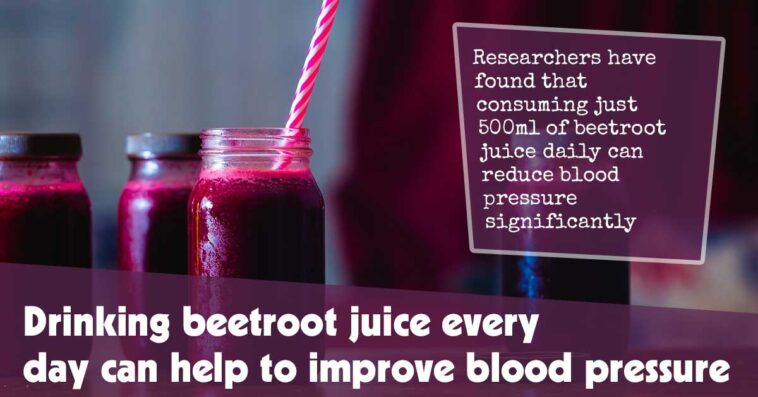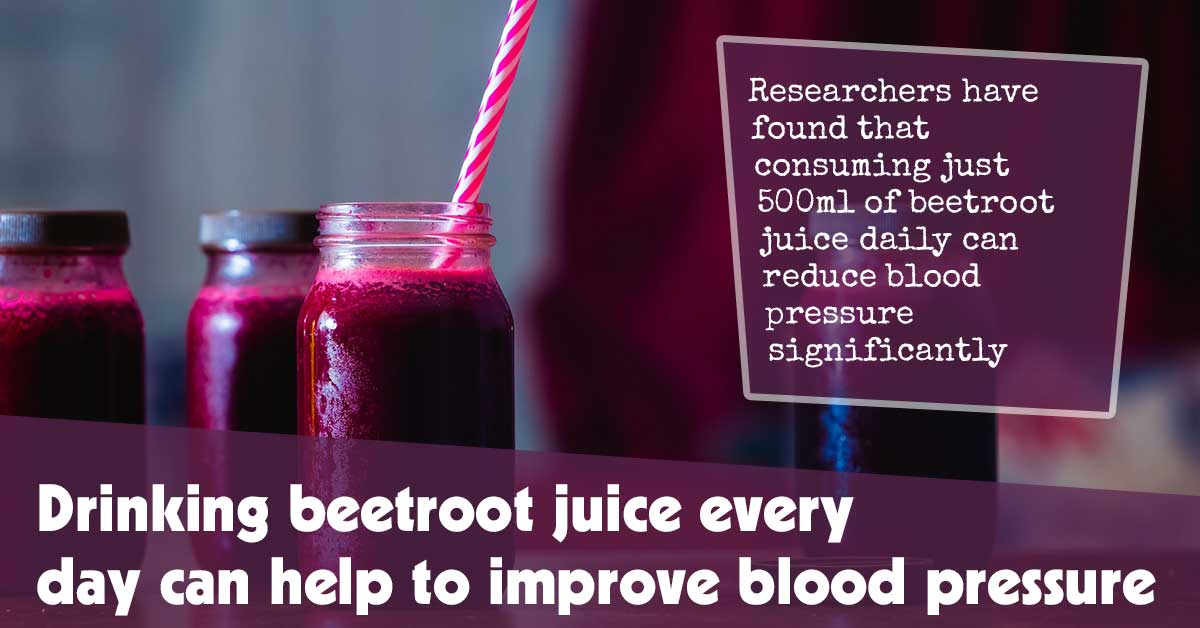Drinking beetroot juice every day helps to reduce high blood pressure
Researchers have found that consuming just 500ml of beetroot juice daily can reduce blood pressure significantly. The research shows that it’s the consumption of dietary nitrate found in beetroot juice, and also in green, leafy veggies, that ultimately leads to a blood pressure reduction. The protective effects of veggie-rich diets had previously been attributed to the antioxidant content.1✅ JOURNAL REFERENCE
DOI: 10.1161/HYPERTENSIONAHA.107.103523
The researchers observed a blood pressure reduction in healthy participants within just 1 hour of beetroot juice consumption, with a peak reduction taking place 3 to 4 hours following consumption. Some extent of reduction carried on being seen until up to 24 hours afterward.
Researchers showed that the blood pressure reduction was a result of the formation of nitrite from the juice’s dietary nitrate. The juice’s nitrate is converted into nitrite in the saliva by the tongue’s bacteria. This saliva containing the nitrite is swallowed and is either transformed into nitric oxide in the stomach’s acidic environment or re-enters the circulation as nitrite.
The peak blood pressure reduction time correlated with the peak circulating nitrite levels, an effect that was lacking in a 2nd group of participants who did not swallow their saliva while consuming beetroot juice, and for 3 hours afterward.
Over 25% of the worldwide population is hypertensive, and it’s been projected that this number will increase to 29% by 2025. Hypertension also causes about 50% of coronary heart diseases and about 75% of strokes.
Drinking beetroot juice every day improves blood pressure and endurance
Other research observed that consuming beetroot juice every day improved blood pressure and exercise endurance significantly in elderly individuals who had preserved ejection fraction heart failure.2✅ JOURNAL REFERENCE
DOI: 10.1016/j.jchf.2015.12.013
The intolerance of exercise, fatigue, and breathlessness with regular levels of exertion, is the main heart failure symptom for preserved ejection fraction and is due to some extent to non-cardiac factors reducing the delivery of oxygen to active skeletal muscles.
Heart failure with preserved ejection fraction is a recently identified condition that reflects how the heart’s left ventricle pumps with each beat. It happens mainly in older women and is the most common type of heart failure, and also the most rapidly growing cardiovascular condition.
Emerging evidence indicates that supplementing dietary inorganic nitrate has a beneficial impact on oxygen metabolism, exercise capacity, vascular health, and blood pressure control.
19 individuals took part in the study to find out if consuming a single dose of beetroot juice or consuming a dose of beetroot juice every day over multiple days was better for improving exercise intolerance.
Blood pressure and aerobic endurance were first measured after the individuals consumed either a placebo or a single dose of beetroot juice.
A dose of beetroot juice was then administered every day to all 19 individuals for 7 days on average, and blood pressure and endurance were measured again. The beetroot juice dosage in the study was equal to 2.4 ounces which contained about 6 millimoles of inorganic nitrate.
It was observed that consuming beetroot juice every day improved aerobic endurance by 24% after 1 week, in comparison to consuming the juice just once which resulted in no improvement. Cycling time to exhaustion at a preset pace less than the participant’s maximum was used to measure aerobic endurance.
Another result was that resting systolic blood pressure was significantly reduced from consuming beetroot juice in the single dose group as well as daily dose group by 5 to 10 mmHg.




